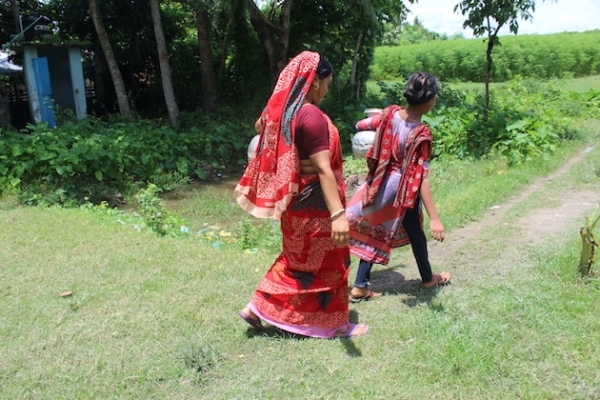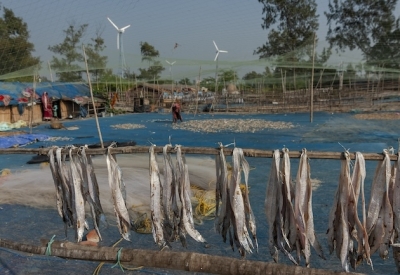DHAKA, Nov 07 (IPS) — Since her childhood, Parveen Begum, 52, has been adding extra salt while eating her meals. However, she did not know that this contributed to high blood pressure.
Recently, she suffered severe headaches, forcing her to go to a physician, and when the doctor checked her health, he she had hypertension.
“I could not take my daily meals without taking additional salt, which helped develop the chronic disease in my health. Now I have to take medicines for blood pressure regularly, putting an extra financial burden on my family,” said Parveen, a resident of Musapur at Raipura in Narsingdi district.
Rabeya Begum, 50, is a resident of the saline-prone Ashabaria village of Rangabali in the Patuakhali coastal district. Like many others, she and her family members often drink saline water since freshwater sources are affected every year due to coastal flooding, cyclones, and storm surges. Salinity instruction has reached the aquifer in her locality.
Local people face scarcity of drinking water during the dry season as salinity reaches an acute level that time, so they are compelled to drink saline water, Rabeya said.
“I felt symptoms of high blood pressure like headache and chest pain. So, I checked it and found blood pressure. But there are not enough facilities for screening blood pressure in our remote village,” she said.
Like Parveen and Rabeya, a huge number of people have been suffering from high blood pressure, also called hypertension, in Bangladesh, but most of the cases remain undiagnosed. High blood pressure is a chronic disease and a silent killer, too.
More than 4.5 crore people, or 25% of Bangladesh’s total population, have high blood pressure, according to recent research by Bangladesh’s National Centre for Disease Control (NCDC).
Hypertension or high blood pressure develops when the pressure level in one’s blood vessels reaches 140/90 mmHg or higher. A healthy lifestyle, quitting tobacco, and remaining more active can help lower blood pressure.
According to the World Health Organization (WHO), around 1.28 billion adults aged 30–79 years worldwide have hypertension, with two-thirds of them living in low- and middle-income countries. An estimated 46 percent of adults with hypertension are unaware of their condition. Only less than half of adults (42 percent) with hypertension are diagnosed and treated.
Undiagnosed Hypertension
Undetected high blood pressure could add to the health burden in Bangladesh. Many people are not on medication as they are unaware of their condition. According to a survey, more than half of hypertensive patients are ignorant of their condition.
Experts say early identification and improved hypertension screening can reduce the high global burden of untreated high blood pressure.
According to a 2022 study, hypertension is common in elderly people, and undiagnosed hypertension increases with age. The risk of undetected hypertension was high among people aged 33–35. Overall prevalence of undiagnosed hypertension among men and women was similar. Men aged above 50 had lower levels of awareness and participation in early detection initiatives.
The study revealed that the prevalence of hypertension is significantly higher among the residents of Bangladesh’s coastal and eastern regions.
It suggested that early detection and screening are urgent for checking the prevalence of undiagnosed hypertension. The study suggested the authorities should take robust health promotion measures in the coastal and northern regions of Bangladesh.
Dr Mahfuzur Rahman Bhuiyan, programme manager of the High Blood Pressure Control Programme at National Heart Foundation Hospital and Research Institute, said it would be possible to reduce the risk of high blood pressure by 50 percent if people avoid the intake of extra salt while taking meals.
He recommended screening people to identify those with high blood pressure.
Hypertension Amplifies Risk of Heart Diseases
Hypertensive heart disease is a long-term condition that worsens with time. In Bangladesh, around 68 percent of deaths are caused by non-communicable diseases, with hypertension accounting for 15–20 percent.
According to the first Global Report on Hypertension 2023, released by the WHO, about 273,000 people die of cardiovascular diseases each year in Bangladesh, while around 54 percent of these fatalities are attributable to hypertension.
The report also reveals that half of the people having hypertension are not even aware of their condition, and the rate of those receiving medical treatment for hypertension is alarmingly low, merely 38 percent.
“Hypertension is one of the leading causes of deaths associated with non-communicable diseases. The prevalence of heart diseases can be reduced to a great extent by keeping hypertension under control,” Prof Sohel Reza Choudhury, Head of the Department of Epidemiology and Research at the National Heart Foundation, told a webinar recently.
National Professional Officer at WHO Bangladesh Office Dr Farzana Akter Dorin, suggested strengthening the primary healthcare system and ensuring free hypertension medicine to cut the risk of developing heart diseases among people.
IPS UN Bureau Report






